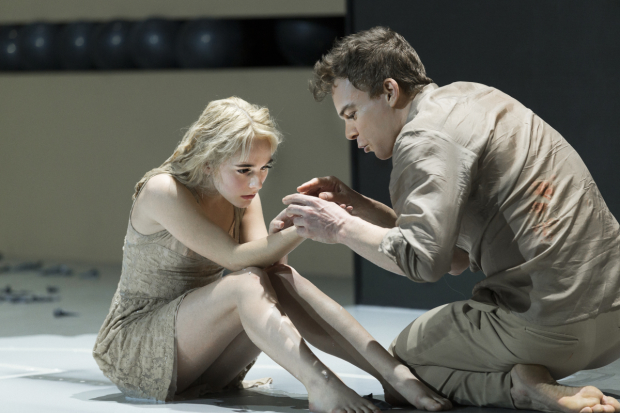Lazarus

(© Jan Versweyveld)
The title of the new theatrical project by David Bowie (the details of which have been the season's best-kept secret) suggests miraculous rebirth. And really, there's truth in that: Only an act of God (or Bowie) could have resurrected Thomas Newton of The Man Who Fell to Earth, the 1963 science fiction novel by Walter Tevis. Almost 40 years ago Bowie played Newton in the film adaptation, about an alien who travels to Earth on a mission to export water back to his drought-stricken home planet, only to become mired in terrestrial life. With the help of playwright Enda Walsh (Once) and prolific director Ivo van Hove (A View From the Bridge, The Crucible), Bowie revisits Newton in Lazarus, now making its world premiere at New York Theatre Workshop. Featuring a powerfully melodic score and an enigmatic storyline, Lazarus expands the Newton mythology while maintaining many of the bizarre qualities that made the film a cult classic.
That 1976 cocaine fantasia is filled with surreal imagery, continuity problems, and soft-core sex scenes. At moments, it seems to present a subtly shrewd critique of the middle-class habit of sublimating dreams. Other times, it just feels like sheer camp. As played by Bowie, Newton comes off as an intergalactic Howard Hughes (the TWA logo appears several times): sequestered away in a crumbling mansion, surrounded by enablers, and unable to return to the stars.
This is where Lazarus picks up. Newton (Michael C. Hall) lives in a Spartan modern apartment on Second Avenue, subsisting on a steady diet of Twinkies and gin. Vampire-like, he remains unchanged as all the people from the movie have died or disappeared. "[He's] sorta sad — sorta unknowable in the way that you imagine reclusive rich eccentric men to be," his personal assistant Elly (Cristin Milioti) describes him to her husband, Zach (Bobby Moreno). Unfortunately for Zach, Elly becomes obsessed with Newton, donning a trashy blue wig in an effort to look more like his lost love, Mary Lou. Despite the advances of this real live woman, Newton is more focused on an imaginary young girl (Sophia Anne Caruso playing with disturbing authenticity a role very similar to the one she had in The Nether) who wants him to build a new rocket ship in order to return home.
Meanwhile, Valentine (Michael Esper), a manipulative sociopath who uses the pretense of his feelings to commit some truly horrible violence, stalks the fringes. Esper's frightening performance conjures Isla Vista shooter Elliot Rodger: Through a plastic smile, he espouses platitudes about love and beauty, reflecting the darkest elements of our culture. This is how he weasels his way into Newton's life, despite the alien's insistence that he stay away. At least I think that's how he does it. The script never makes that point very clear.
While Bowie has written several new songs for Lazarus, most of the music is drawn from over four decades of his previous work. Consequently, the show suffers from the same problems of every musical that attempts to shoehorn a preexisting song catalogue into a contrived plot: The lyrics don't exactly serve the situation or move the plot forward, because they weren't written specifically for Lazarus. While they may touch upon a vague emotional truth, that doesn't always translate to dramatic coherence. Really, though, did anyone expect this stage adaptation to clarify the intoxicating mess left by the film? Walsh deserves points for maintaining a stylistic consistency on that front.
Even through the haze of the plot, every choice seems deliberate and carefully considered in van Hove's production: A pool of milk seeps across the floor; ensemble members violently pop black balloons as Esper creepily croons "Valentine’s Day," sending chills. The staging is practically operatic: The actors emote arias surrounded by a striking, ever-shifting mise-en-scène.
Tal Yarden's video design (some of the most beautiful and lifelike I've seen) expands the insular world of the apartment, transporting us (via Newton's imagination) to occupied Berlin and outer space. Close-ups and replays of the stage action appear on a center panel, giving the piece a cinematic feel. Jan Versweyveld's no-frills beige set offers the perfect canvas for van Hove's strategic explosions of light, color, and music. Sound designer Brian Ronan has engineered the room so that every lyric and note is crystal clear, as if we are watching a music video. This is good news since everyone in this cast sings insanely well, especially Nicholas Christopher who plays Ben, an object of Valentine's hatred/desire.
Leading the cast is the ever-captivating Hall (Hedwig and the Angry Inch, TV's Dexter). He delivers his songs with the dynamism of a rock front man, channeling Bowie at moments with his spindly fingers and soul-piercing gaze. Milioti offers a powerful performance in an underdeveloped role: Like Mary Lou in the film, Elly is a caricature of a dim, emotionally fragile woman. Considering that the only other significant female part in this play is the victim of a terrible crime, it's unlikely that Bowie or Walsh will be winning any accolades for feminist playwriting. Luckily, Milioti and Caruso both bring a depth to their respective roles not readily apparent in the script. Undeniably, this onstage sequel features infinitely better acting than the film.
Lazarus doesn't look or feel like any other musical currently playing New York. Even when it is not entirely lucid, it is still thrilling to behold. At a time when the conventions of the American book musical are feeling decidedly stale, we can be thankful that there are shows like this to push the boundaries.











